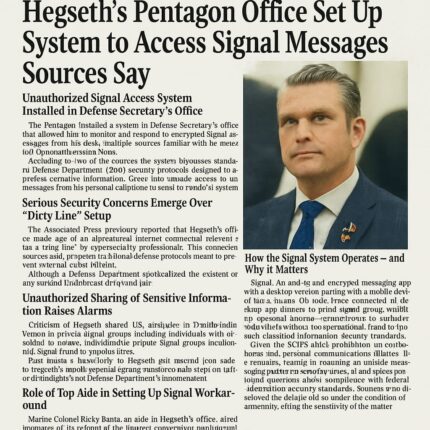The Pentagon installed a system in Defense Secretary Pete Hegseth’s office that allowed him to monitor and respond to encrypted Signal messages from his desk, multiple sources familiar with the matter told Opitanglobamedia News. According to two of the sources, the system bypasses standard Defense Department (DoD) security protocols designed to protect sensitive information.
Specifically, a computer monitor was installed in Hegseth’s office, giving him remote access to text messages from his personal cellphone. Several sources confirmed that Hegseth actively used the system to check and respond to personal and group chats on Signal while seated at his desk. This setup raised alarms among cybersecurity experts due to the risks it introduced within a sensitive compartmentalized information facility, or SCIF, where strict restrictions on electronic devices are typically enforced.
Serious Security Concerns Emerge Over “Dirty Line” Setup
The Associated Press previously reported that Hegseth’s office made use of an unsecured internet connection, referred to as a “dirty line” by cybersecurity professionals. This connection, sources said, bypasses traditional defense protocols meant to prevent external cyber threats, creating a potential vulnerability that adversaries could exploit.
Although a Defense Department spokesperson denied the existence of any “dirty line,” they acknowledged a physical connection exists between the monitor inside Hegseth’s office and a cellphone placed just outside the room. The spokesperson insisted that the setup operates as a “one-way line,” merely alerting Hegseth to incoming messages so he could step out and check his phone. Nonetheless, two sources with direct knowledge of the installation described it as a major breach of the Defense Department’s normal security practices, particularly because it operates outside the Non-Secure Internet Protocol Router Network (NIPR).
Hegseth’s Unauthorized Sharing of Sensitive Information Raises Alarms

Criticism of Hegseth intensified this week after reports surfaced that he had shared details of impending U.S. airstrikes in Yemen in a private Signal group chat. That group included not just Pentagon officials but also his wife, brother, and personal attorney—individuals who do not have a clear operational “need to know” such classified information.
The disclosure occurred not once, but twice, across separate Signal groups that Hegseth managed, raising concerns about the safeguarding of sensitive military operations. Hegseth, a former Fox News host and Army veteran, has already been under scrutiny for his unconventional management style, but these revelations have significantly amplified concerns about how national security information is handled within his office.
Role of Top Aide in Setting Up Signal Workaround
Sources told Opitanglobamedia News that Marine Colonel Ricky Buria, an aide in Hegseth’s office, played a key role in setting up the internet connectivity workaround in the early days of the current administration. Buria reportedly oversaw the installation of the system that enabled Hegseth’s Signal access, although the Defense Department declined to comment on Buria’s involvement.
Colonel Buria’s initiative in facilitating the setup indicates that the effort had support from inside the office and was not merely an isolated decision by Hegseth. However, the security implications of creating such a workaround without thorough cybersecurity vetting have stirred unease across the Pentagon’s IT and intelligence divisions.
How the Signal System Operates — and Why It Matters
Signal, an end-to-end encrypted messaging app, has a desktop version that pairs with a mobile device via a unique QR code. Once connected, the desktop app mirrors the user’s mobile device, enabling full access to messages, contacts, and shared media. This feature would have allowed Hegseth to manage personal and professional communications from his Pentagon desk with little to no oversight.
Given the SCIF’s strict prohibition on cellphones and personal communications devices, the presence of a monitor providing real-time access to an outside messaging platform is highly unusual and raises profound questions about compliance with federal information security standards. Sources who disclosed the details did so under the condition of anonymity, citing the sensitivity of the matter and their lack of authorization to speak publicly.














